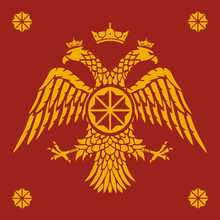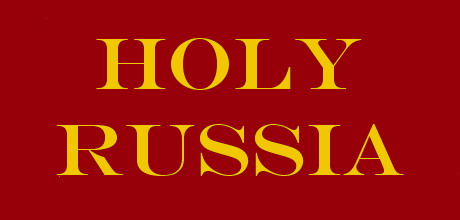THE CONSTITUTION OF HOLY RUSSIA The First chapter THE BASIC STATE LAWS OF HOLY RUSSIA – THIRD ROME 1. Holy Russia – Third Rome is the sovereign confederative state created by Russian Imperial House of Rurikovich and peoples united in it, private and state subjects in any parts of the world. 2. Russian is language nation-wide and is obligatory in all state and public institutions. German and English languages admit as state languages also. The use of local languages and adverbs in the state subjects of Confederation is defined by laws of subjects. 3. Holy Russia – Third Rome is the Christian state. 4. Solidus is the coin of pure gold in weight of 10 grams, is monetary unit of Holy Russia. All currencies of subjects of Confederation have in the basis part of Solidus cost, determined by laws of the market. The Second chapter ABOUT THE ESSENCE OF IMPERIAL AUTHORITY OF HOLY RUSSIA – THIRD ROME 5. Sovereign to Emperor of Holy Russia – Third Rome possesses the Supreme Authority given by the God and limited to the Constitution of Holy Russia for the good of people. 6. The person of Sovereign Emperor is Holy, esteemed and inviolable. 7. Sovereign Emperor professes Christianity of Holy Russia and is Pontifex Maximus of Nova Church of Holy Russia. 8. The imperial authority passes only on man's line from the father to the son and in case of its suppression is transferred by elections to new Emperor from the Sort of Russia Rurikovich. 9. Sovereign Emperor carries out executive authority in unification with the Government of Holy Russia and legislature together with the State Duma consisting of two chambers – Boyar and National Duma. The Boyar Duma is appointed Sovereign Emperor and the National Duma is selected national voting. 10. Sovereign Emperor possesses the right of the legislative initiative and the right of the veto in all subjects of the legislation. 11. Sovereign Emperor asserts the laws accepted by the Duma, and without His statement no law can have the fulfillment. 12. The executive authority belongs to the Council of Ministers of Holy Russia supervised by Chairman of the government which is put forward by the Duma, is selected national voting and affirms Sovereign Emperor. 13. The control of executive authority over all his volume belongs to Sovereign Emperor within the limits of all State of Holy Russia. 14. Sovereign Emperor, by way of the Supreme management, issues, according to laws, Decrees for the device and actuating of various parts of the government, and is equal the commands necessary for execution of laws. 15. Sovereign Emperor is the Supreme Head of all attitudes with subjects of Confederation and external relations of Holy Russia to foreign powers. He defines a direction of a world policy of Holy Russia. 16. Sovereign Emperor declares war, concludes the world, and signs Contracts of Confederation and perhaps contracts with the foreign states. 17. Sovereign Emperor is the Majestic Leader and the Commander-in-chief armed forces of Holy Russia – Third Rome. 18. Sovereign Emperor declares districts on military or special position. 19. Sovereign Emperor possesses the right of stamping of coin and release of bank notes, and also definition of their appearance. 20. Sovereign Emperor favors titles, awards and other state differences, and also the right of condition. He directly defines conditions and the order granted titles, awards and differences. 21. Sovereign Emperor issues directly decrees and commands as concerning the property making His personal property so it is equal in the attitude property, called Sovereign which, always belonging to the Reigning Emperor, cannot be bequeathed, act in section and is subject to other kinds of alienation, and also do not submit to payment of taxes and tax collections. 22. To Sovereign Emperor as to the Chapter of the Imperial House, belong, according to establishment about the Imperial Surname, orders property specific and confederative. 23. The judicial authority is independent and is carried out on behalf of Sovereign Emperor by the courts established by the law which decisions are executed by the Name of Imperial Majesty. 24. Sovereign Emperor possesses the pardon condemned, mitigation of punishments and the general pardon made criminal actions with the termination judicial against them prosecution and their clearing of court and punishment, and also in general talent of favor in the special cases which are not suitable under action of the general laws. 25. Decisions of the code of laws about the order of heritage of the Throne, about majority of Sovereign of Emperor, about the Government and trusteeship, about the introduction on the Throne and about the oath of citizenship, about Holy coronation and confirmation, about Title of His Imperial Majesty both about the State Emblem and about belief are valid Organic laws. 26. The establishment about Russian Imperial House of Rurikovich, being valid Organic laws, can be changed and supplemented only personally with Sovereign Emperor in predict Him the order if change and additions of this Establishment do not concern the general laws and do not cause new budgetary charges. 27. Decrees and commands of Sovereign Emperor, by way of the Supreme management or it is direct him issued, ratified Chairman of Council of Ministers and will be promulgated by Council of Ministers. The Third chapter ABOUT THE RIGHTS AND DUTIES OF CITIZENS OF HOLY RUSSIA – THIRD ROME 28. In all territory of Holy Russia confederative Roman citizenship of Holy Russia is established, for each Roman citizen is citizenship of the subject of Confederation is kept. The Roman citizens of Holy Russia outside Confederation are under protection and protection of Holy Russia. Conditions of purchase of the rights of citizenship of Holy Russia, no less than their loss, are defined by the law. 29. To all Roman citizens, foreigners and persons without the citizenship, living in territory of Holy Russia, rights and freedom stipulated by the Constitution of Holy Russia and conventional norms of international law are guaranteed. 30. Holy Russia guarantees to all Roman citizens, the political, public and religious organizations working within the framework of the Constitution of Holy Russia, equal legal opportunities to participate in management of the state and public affairs. Division of legislative, executive and judicial authorities is the major principle of functioning of Holy Russia as lawful state. 31. The person, his rights and freedom are the maximum value. A recognition, observance and protection of the rights and freedom of the person and the citizen are duty of the state. 32. Expression of authority of people is the referendum and free elections. The Roman citizens have the right to select and be elite in bodies of the government and institutions of local government, and also to participate in a referendum.
33. The Roman citizens can be elected by local judges, public prosecutors and heads of law-enforcement bodies. 34. Protection of the Throne and Fatherland is a Holy duty of each Roman citizen. The man's population, without distinction of conditions, is subject to a military duty according to decisions of the law. 35. The Roman citizens are obliged to pay the taxes established by the law and duties, and also to leave duties according to decisions of the law. 36. Nobody can be subject to prosecution for criminal action differently, as in the order determined by the law. 37. Nobody can be detained under arrested differently, as in the cases determined by the law. 38. Nobody can be we judge and is punished differently, as for the criminal actions stipulated working during fulfillment сих of acts by criminal laws if only again issued laws do not exclude accomplished guilty acts from among criminal. 39. Nobody should be exposed to tortures, violence, cruel treatment or punishment. Nobody can be without the voluntary consent to subjected medical, scientific or other experiences. 40. The dwelling of everyone is inviolable. Manufacture in dwelling, without the consent of his owner, search or dredging is supposed not differently, as in cases and in the order, certain by the law. 41. Each Roman citizen has the right to select freely a residence and employment, to get and alienate property and free to leave for limits of the State. Restrictions in these rights are established by special laws. 42. In Holy Russia the unity of economic space, free moving of the goods, services and money resources, support of a competition, freedom of economic activities are guaranteed. 43. The property is inviolable. Compulsory alienation of real estate, when necessary for any state or public advantage, is supposed not differently, as for fair and decent compensation. 44. In Holy Russia admit and protected similarly Sovereign, private, state, municipal and other patterns of ownership. The Earth and other natural resources are used and protected in Holy Russia as basis of life and activity of the state. 45. Everyone has the right to inviolability of private life, personal and family secret, protection of the honor and reputation. Everyone has the right to secret of correspondence, telephone conversations, post, cable and other messages. Restriction of this right is supposed only on the basis of judgment. 46. The Roman citizens have the right suit freely assemblies with view of, not opposite to laws, peacefully and without the weapon. The law defines conditions at which there can be assemblies, the order of their closing, and restriction of places for assemblies is equal. 47. Everyone can is free orally state and in writing the ideas, and equally to distribute them by seal or different ways. Everyone has the right to search, receive, transfer, make and distribute freely the information in any lawful way. 48. The Roman citizens use freedom conscience. Conditions of using this freedom are defined by the law. 49. The Roman citizens have the right to form societies and the unions with view of, not opposite to laws. Conditions of formation of societies and the unions, the order of their actions, conditions and the order of the message to them of the rights of the legal person, it is equal as the order of closing of societies and the unions, are defined by the law. 50. Restrictions of action of the decisions stated in the Third chapter concerning the districts declared on military or special position are defined by special laws.
Grand Prince of All Russia
Valeriy Viktorovich Kubarev Grand Kubensky Moscow, Holy Russia September 21, 2013
| 











